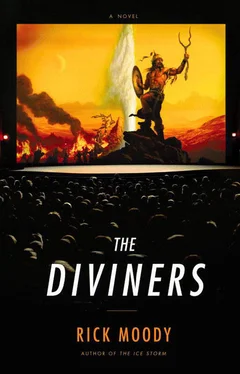There is an interval of dramatic silence in the monologue of the large woman in his car, because she has arrived at an inexplicability in her recitation of events. Her eyes are filled with moisture, which Ranjeet can see in the rearview, but this woman will not be made a mockery of, not in a car service vehicle, which is at the present moment stuck in a sequence of lights before the Brooklyn Bridge, at the edge of an empty section of warehouses near the neighborhood called Dumbo, a neighborhood of strangely dressed young people. After the interval of silence, she rises toward the summit of her own narrative.
“Well, of course the first thing I had to do was clean all of that up, because I wasn’t going to leave that all over the floor, the john all backed up for when the paramedic guys arrived. I mean, I’m not going to go back to the house after that and clean it up, and I’m not going to leave it for the cleaning woman. So the first thing is I’m down on my hands and knees, and I’m cleaning this up while she’s in the tub berating me, saying all the usual stuff. I was a disgrace, blah blah blah, why can’t I get married, like, why do I have to be like I am, which is a disgrace, why is her only daughter one of those sorts of women, and does this reflect badly on her in some way? I mean, it’s not like she had a lot of boyfriends after Dad left. Same old list of grievances, I don’t have to tell you. She gave me curlers once, did I tell you that, and she’d invite guys from off the street — no, okay, sure, I understand. Yeah, I’ll finish up. .”
Did they envision in the last century that one day this bridge would welcome men and women from India and Pakistan and Bangladesh, men and women from Ivory Coast, or Ghana, or Malaysia, or Sri Lanka, welcome them into the conspiratorial enterprise of Manhattan, promising, for example, that a man like Ranjeet could enroll his son in the schools here, so that his son would not be lying in an empty room with a cement floor at the back of a tiny apartment in Delhi because no academy would take him in or teach him anything, such that he would have to take up begging, and no one would have him, except perhaps Christian churches, no one would massage his strange toes, no one would kiss his strange Mongolian eyes? The bridge, with its stone towers, east and west, seems to answer resoundingly yes to such a question as this, when imagined by a car service driver during dull stretches of traffic, and he finesses the merge onto the FDR before she has even finished explaining again to the psychiatrist about her mother’s sickness, which Ranjeet can’t yet diagnose, though he does hear something about a pancreas. This is a thing he does not know well. The women do not drink alcoholic beverages in his family; the men do not drink alcoholic beverages, except that occasionally they do, occasionally they go out into the parks and they drink and take off their turbans, at least in his family they do this, though they do not let it affect their many responsibilities.
“I’m supposed to have this meeting this morning. About the new project, and it’s ruined, it’s ruined. How the fuck am I supposed to get one of these movies made if I’m always back at the house trying to keep her from ordering me zircon-encrusted jewelry from some newspaper circular so I’ll be able to attract the right kind of man? Or calling the call-in programs, saying that the immigrants don’t respect the nation, even though she’s practically an immigrant herself, and she’s leaving me notes about how I’m supposed to produce an heir or else.”
A spell begins to overcome Ranjeet. The spell of that perfect word, that pair of syllables that changes everything. Movies. It is a word as perfect as the two perfect etymological American exports: okay and Coca-Cola. The word movies may have its origin in Sanskrit, movati, in which one pushes or shoves; movies, culturally speaking, involve a fair amount of pushing and shoving. It is a global romance, a word of American promise as is no other, a word that summons the glittering prizes offered by this land of opportunity, the word movies. He knows about movies; he knows about films of bodybuilders, about teen sex comedies. He knows about sequels. His son also likes animated cartoons with violent passages. The word movies transports Ranjeet Singh, leading him to power up his own cell phone in order to call his cousin Hardeep in Jersey City. He must shout because his cell phone is not effective. They are now a two- cell phone Lincoln Town Car, hurtling under the Williamsburg Bridge, alongside the East River, in Manhattan. There is a Coca-Cola sign, look there. To the wife of Hardeep, he says that he cannot talk to her now, “Please don’t start about purchases you have just made, just please hand the telephone to Hardeep,” and then, in Punjabi, a dialect known for its colorful curses, he tells his cousin Hardeep the situation. There is this rather large blond woman in the car, and he does not know for certain, but he believes that the woman in question is employed in the business of the movies. Could it possibly be that she is in the movies? Could it possibly be that he has a famous person in his car? Once he had a politician in his car, the president of the borough of Brooklyn in his car, but this did not impress him. Not like the present instance. Because of the nature of his studies at university, he tells Hardeep, he knows movies. Wait, let him listen a little more. And Ranjeet strikes a pensive pose.
“Yeah, of course, these things really make me want to engage in acting-out behavior. I mean, the terminology makes me want to vomit, but I don’t know what else to call it, so for today, I’ll just say I’m having thoughts. Okay? Does that make you happy? Does that mean that I’m no longer exhibiting resistance? I missed a really important meeting this morning. I used to have a career, you know? I actually made the occasional movie once upon a time. Now I’m cleaning the shit out of the bathroom of my alcoholic mother, who has soiled herself and is sitting in the dry bathtub, drinking, with the television blaring, and I’m thinking about acting-out behavior.”
In their country Hardeep was instrumental in the beginning of the hacker phenomenon. He claimed to have authored a virus. A message would pop up on pornographic Web sites telling the user that a woman’s body is a holy temple of God. Now Hardeep is writing code for large corporations, Web-based products, business applications. It pays handsomely. Hardeep and his wife and children live in a condominium in Jersey City, near the Newport Center. Ranjeet tells his cousin that he must urgently search online databases for the identity of this woman from the movies, and Hardeep asks, in his husky voice that sounds brusque even when he is being sentimental, if Ranjeet happens to know the name of the woman from the movies, and Ranjeet is forced to concede that he does not know her name, for she has not given it. She does not need to give her name to secure a car.
“Don’t do the detachment thing, please,” the large passenger is now saying into her pendulous transmitter. “I don’t need a bunch of questions about how I feel about it. I’ll tell you how I feel about it. I feel like I have nowhere else to turn. I feel like I’m stuck with a madwoman. And she’s not even in the attic; she has the better apartment. It’s more like I’m in the attic, and the whole thing is reversed, and I’m the one who’s going out of my mind, and I’ll die first, of boredom, because I can’t take her complaining and her incoherence, her demands and her spontaneous hemorrhaging —”
Ranjeet makes for the Forty-second Street exit. Which means that he will be going past the United Nations. He tells Hardeep that there is absolutely no chance that the woman is a movie actress, because she is very plump, and in this country she would not be a film star, by reason of plumpness. There are character actors who are noted for their plumpness, but they are considered fit only for ridicule. Perhaps in India, where a large wife is to be adored, Hardeep’s wife being an example, she could be an actress. There she would make the sky feel badly about its imperfections. “Perhaps she is a film editor,” Hardeep offers. So Ranjeet is considering just saying something to her, shouting across the seat, over the rhythmical chants of the dispatcher, Forty-eight, pickup, forty-eight, “Excuse me, plump young lady, because I’m a film scholar in my homeland and I cannot help overhearing that you are involved in the movie business. I would like to inquire about your employment. In what area particularly are you involved in this film business? You are perhaps an agent? Or a casting director?” But before he can say anything, she shouts in such a way that there is no mistaking that it is he with whom she is attempting to communicate, “Excuse me, uh, I’ve had a little change in plans, and now we’re going to have to go back down to Fourteenth Street; I’m really sorry —”
Читать дальше












